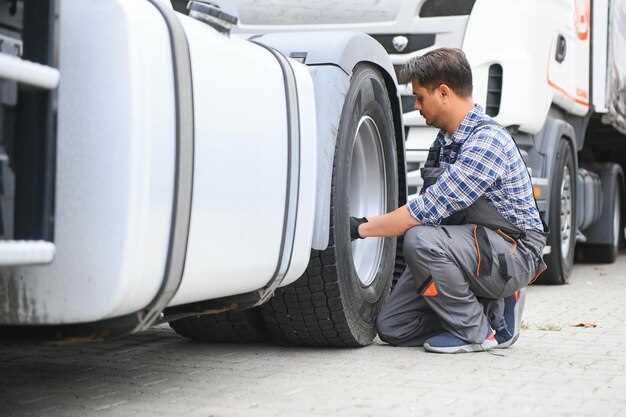
Experiencing a blowout while towing a trailer can be a nerve-wracking situation for any driver. Understanding how to react properly can mean the difference between a minor inconvenience and a serious accident. In this guide, we will provide essential tips that will help you manage a trailer tire blowout safely and effectively.
Having the right knowledge and preparation is crucial when it comes to handling unexpected situations on the road. This article outlines pragmatic tips designed to ensure your safety, the safety of your passengers, and the protection of your trailer and cargo during a blowout.
Being equipped with the right tools and information can empower you to deal with tire emergencies calmly and confidently. As we delve into the details, you’ll discover how to recognize the signs of a potential tire failure, the correct steps to take when a blowout occurs, and preventative measures to minimize the risk of future incidents.
Identifying Signs of an Impending Trailer Tire Blowout
Being able to recognize the signs of an impending trailer tire blowout is crucial for safe towing. Early detection can help prevent emergencies and ensure the safety of your vehicle and cargo. Here are some tips to identify potential issues:
- Uneven Wear: Regularly inspect your tires for uneven wear patterns. This can indicate misalignment or improper inflation, both of which can lead to blowouts.
- Low Tire Pressure: Keep an eye on the tire pressure. Tires that are under-inflated are more prone to blowouts. Use a pressure gauge frequently to ensure they are at the recommended levels.
- Cracks and Bulges: Inspect the sidewalls for cracks, blisters, or bulges. These imperfections can weaken the tire structure and lead to a sudden failure.
- Excessive Heat: If you notice that your tires feel excessively hot to the touch during travel, this could indicate overheating, which is a precursor to a blowout.
- Vibrations or Noise: Pay attention to unusual vibrations or noises while towing. These sensations can signal internal issues within the tire that may lead to failure.
- Frequent Punctures: If you are experiencing repeated punctures or tire damage, it may be a sign of poor tire quality or compatibility with your towing situation.
By staying vigilant and performing regular maintenance, you can minimize the risk of a tire blowout and enhance your safety on the road.
Emergency Steps to Take Immediately After a Blowout

Experiencing a blowout while towing a trailer can be alarming, but knowing the correct emergency steps can ensure your safety and that of others on the road. Here are some essential tips to follow right after a trailer tire blowout.
1. Remain Calm: The first step is to stay composed. Panic can lead to hasty decisions that may endanger your safety. Take a deep breath and prepare to act responsibly.
2. Grip the Steering Wheel: Maintain a firm hold on the steering wheel to keep control of the trailer. This helps prevent swerving, which can cause collisions or rollovers.
3. Gradually Release the Accelerator: Avoid slamming on the brakes. Instead, gently ease off the gas pedal to decelerate the vehicle gradually. This helps maintain stability while slowing down.
4. Steer Straight: If the trailer begins to sway, steer straight and avoid making sharp turns. A smooth trajectory helps control the vehicle and reduces the risk of losing control.
5. Signal and Move to Safety: Once you have slowed down, activate your hazard lights, and signal to merge onto the shoulder or a safe area away from traffic. Always ensure you’re not in the path of oncoming vehicles.
6. Inspect the Damage: After coming to a complete stop in a safe location, carefully inspect the trailer for any visible damage. Ensure that it’s safe to proceed before making any repairs or changes.
7. Change the Tire or Seek Assistance: If you have the necessary tools and the situation allows, consider changing the tire. If you’re unsure or unable, call for roadside assistance. Safety should be your top priority.
By following these emergency steps, you can manage a trailer tire blowout effectively and minimize risks on the road. Always remember to prepare yourself with proper knowledge and equipment before hitting the road.
Preventive Measures for Trailer Tire Maintenance

To significantly reduce the risk of a tire blowout while towing your trailer, regular maintenance and proactive measures are essential. Here are some effective tips to ensure your trailer tires remain in optimal condition:
1. Regular Tire Inspections: Frequently check your trailer tires for signs of wear and damage. Look for cracks, bulges, or foreign objects embedded in the tread. Conducting visual inspections can help you identify problems before they lead to a blowout.
2. Proper Inflation: Maintain the correct tire pressure as recommended by the manufacturer. Under-inflated or over-inflated tires can increase the risk of blowouts. Use a reliable pressure gauge to check tire pressure regularly, especially before long trips.
3. Tire Rotation: Rotate your trailer tires periodically to ensure even wear. This practice extends the lifespan of the tires and helps maintain balanced handling and safety on the road.
4. Load Management: Adhere to the trailer’s load capacity guidelines. Overloading can lead to excessive stress on the tires, contributing to blowouts. Distribute the weight evenly across the axle to improve stability and tire performance.
5. Quality Tires: Invest in high-quality tires specifically designed for trailer use. Quality tires are more resilient and have better performance characteristics, reducing the likelihood of blowouts.
6. Seasonal Checks: Before changing seasons, inspect your tires as temperature fluctuations can affect tire pressure. Ensure your tires are in good condition for the seasonal changes, especially if you plan to store the trailer during winter.
7. Proper Storage: If your trailer will be stored for an extended period, consider using tire covers and parking it on a flat, level surface. This practice helps prevent flat spots and prolongs the life of the tires.
Implementing these preventive measures will enhance your safety and performance on the road, minimizing the risk of tire blowouts and ensuring a smoother towing experience.





